Table of contents
New format: This newsletter and our podcast will now be about our startup journey. Reply to this email to send us feedback!
(Re)introduction: Recap of who we are and what we’re doing.
Stories from the trenches: we formed a company, had an offsite in Vancouver, conducted user research sessions, got me back into coding, and banged our heads against the complexity of Google’s enterprise products.
Latest episode: Ep. 31 - Behind the scenes
Subscribe and read on. If you know someone who will enjoy this, please forward the email!
Behind the scenes, vol. 1
For some of you this post will be the first introduction to Metacast, so let’s break the ice first.
Who are we?
I’m Ilya Bezdelev, a co-founder at Metacast Inc, a podcasting software company whose mission is to feed my family and the family of Metacast co-founder Arnab Deka.
Wait… Did you expect I’d say something about changing the world?
We leave changing the world to big companies, scientists, and social media influencers. Our ambition is to build a profitable, self-sustaining business that will make a difference for a tiny sliver of world’s population (albeit, it might still be an absurdly large number of people).
As of this writing, we have not taken any outside investment and are bootstrapping our company. Surviving matters, so we put profits first, making a dent in the universe second.
Both of us cut our teeth at big tech. Most recently, Arnab was a Principal Engineer at AWS while I was a Sr. Product Manager at Google and, prior to joining the “do no evil” gang, I was a Principal PM at AWS. That’s where we met — Arnab and I worked together for 5 years at Amazon and built some cool things including AWS Chatbot, which we started from scratch and launched into a successful AWS service.
The higher we grew in the traditional corporate career ladder, the less fun we had doing our jobs. I burned out at Amazon and left to Google only to find out it was more of the same under a different brand name. Arnab grew to a principal level only to find himself mired in big company politics and processes instead of doing what he loved most — building products.
So we both took a leap of faith and left our comfortable, high paying jobs to start a company of our own. We finally stopped being “wantepreneurs” and became entrepreneurs.
What are we working on?
We are building a next-generation podcast listening app and a software platform for podcasters.
For years, we’ve been dissatisfied with podcast apps. Both Arnab and I are podcast connoisseurs, but we feel like we and users like us have not been served well by the incumbents. A few months ago, our dissatisfaction reached the boiling point and we decided to scratch our own itch and build an app that we both will enjoy using. Hopefully, others will love it too and it’ll become a sustainable business for years to come.
We’ve been using our own app for a few weeks now. It has a few rough edges, but it’s an amazing app and we both love it. It’s the best podcast app I’ve ever used and I say this not because it’s my baby and I’m very passionate about it... but I’m not known for being overly objective with my children, so try it for yourself when it comes out.
We can’t say what exactly the app is because we’ve not launched it yet. We’ll soon start a closed, invite-only beta with a handful of users to get feedback and validate our assumptions. After that, we’ll go full steam ahead to launch it publicly. If you’re into podcasts and want to get early access, send us a note at founders@metacast.app.
What’s up with our podcast?
Those of you who followed us from the early days know that we had a weekly podcast called “Metacast: the podcast about podcasting,” to which we invited podcasters and entrepreneurs building podcast tech. We started the show in the first week of 2023 with the hypothesis that it’ll resonate with podcasters.
It turns out, many podcasters don’t listen to podcasts. They’re too busy running their own shows. Besides, we were not very disciplined and ended up talking about entrepreneurship more than we did about podcasting. We naturally morphed our podcast into a “co-founders shoot shit about stuff” kind of show.
Besides, we met a few of our superfans who had been with us for a while. They were not podcasters but people similar to us a few months back — corporate employees with a dream. Our stories about leaving jobs and starting a company resonated with them. Our personalities resonated with them. They formed an emotional connection with us.
So, we decided to “reorg” the podcast. It’s now called “Metacast: Behind the scenes” and its purpose is to document our entrepreneurial journey, similar to what Josh Pigford did for Baremetrics a few years ago and what Paul Ford and Rich Ziade did with the Postlight podcast. We gave ourselves a non-exclusive, perpetual license to talk about whatever we want in relation to building the company. It’s more fun that way.
We’ll continue having guests, but we’ll do it as we please. Previously, we had guests every other week, but scheduling was too much of a hassle. We need to focus on the product, not running a podcast, so we’ll keep doing guest episodes every now and then but not consistently.
What else have we been up to?
This section will be the meat of the newsletter going forward. We’ll document what we’ve been doing and what lessons we learned on our startup journey since the last email.
Company formation
We deliberated a lot about the legal entity that we should form for the company. We finally settled on a Delaware C-corporation, which is a for-profit corporation formed in the state of Delaware. All startups do that and, since we might need funding in the future, we decided to go the investor-friendly route.
Arnab’s Canadian residency was the tricky part though. Surprisingly, there is very little information about a setup where a Canadian owns shares in a U.S. C-Corp. After consulting a few people and agonizing over the decision, we formed the company such that Arnab owns his shares through a Canadian holding company, which will help optimize taxes in the future. If you’re in a similar situation, feel free to ping us to chat about this at founders@metacast.app.
To make sure we protect ourselves, we’ve set up a share vesting schedule for four years with a one year cliff. Each of us will get 25% of their stocks at the end of year 1 (the most difficult year of the startup life that requires the most commitment). We’ll be getting the remaining 75% in equal monthly amounts over the course of the subsequent 3 years.
This setup protects founders in case one of us leaves the company early on with a significant amount of shares, thus reaping the benefits of the hard work they did not do. Such vesting arrangement is very common in venture-backed startups but may be less common in bootstrapped companies where founders “trust each other.” We believe in transparency and fairness, so we had an uncomfortable conversation early on and did the right thing.
For incorporation of a C-Corp, we used Clerky. We looked at a few other service providers, but Clerky was the only one that had an easy, self-service tool to issue shares to a Canadian company controlled by a single founder.
The total cost of registering the company was $799 + some change to mail forms to the IRS + $344 to register a “foreign qualification” in Florida (US corporate law is no joke, no wonder lawyers get paid a lot).
In-person offsite in Vancouver
I live in Miami metro area whereas Arnab is in Vancouver. We decided that every 3 months or so we need to get together and work face-to-face. My family was out of town on vacation and I used this opportunity to go and live with Arnab’s family for two weeks.
That was awesome and we got a lot done. Also, we had a few hard conversations that were a lot easier in person!
At the “offsite,” we focused a lot on the prioritization of features and making hard decisions (mostly about what not to ship and what compromises to make).
For prioritization we use this rubric:
P0 (priority zero) — features/bugs that block the launch
P1 — must have but can be shipped after the launch
P2 — nice to have
A few months ago, we started with a lot of P0s we thought were important, but over time most of them got downgraded to P1s. The key insight here is that most of your P0s are in fact P1s but you are attached to the idea of a perfect product and do not prioritize ruthlessly enough.
Money runs out. We have to ship. So we cut the scope. Read my full post about this on LinkedIn.
User research sessions
A few weeks ago, we started reaching out to our friends asking them if they want to participate in our closed beta. Arnab had an insight that, before we give the app to them, we should first learn how they listen to podcasts today. So, we did a few user research (UXR) sessions.
First, we did what user researchers do — came up with a bunch of questions that we wanted to go through in a sequential order, document answers, analyze, and synthesize patterns.
In the very first session, we asked participant to share his screen to show us what he was actually doing, which sent all of our UXR planning out of the window.
We started randomly asking questions and observing what the participant was actually doing. Instead of formal user research, we ended up with something akin to an anthropology study where a researcher observes the subject as they use the software in their day-to-day life. All of our subsequent studies were like that too. We asked the participants to share their screens and show how they listen to podcasts. We learned a lot by watching.
The key insight we got from the ongoing research is that no two people are alike in their podcast listening patterns. That was surprising, especially to Arnab because no one in the research group came even close to the advanced level of playlist usage that he employs in his day-to-day podcast listening. This helped us deprioritize some of the features we thought were important.
In product development, it’s important to say “no” to more things than you say “yes” to. Talking to potential users is one way to understand which ideas to say “no” to.
All hands on deck — I got back into coding
This is something I am personally very excited about!
I started coding back in late 90s as a teenager and got a degree in computer science in early 2000s. I eventually transitioned to “business” and coding has been mostly a side project affair for me ever since. But I always wanted to write application code again.
While I was in Vancouver, Arnab helped me set up a development environment for the mobile app (we use Flutter) and Firebase (TypeScript) on my laptop. My first commit was 4 lines of code fixing a small edge case bug. Boy, did it feel good to see the change take effect in the app!
My goal is to offload Arnab and fix bugs when I have time, so he can focus on big things. I’m looking forward to mastering Flutter, banging my head against TypeScript’s asynchronicity, and introducing more bugs to our app!
We wrote a book
Early on we decided that we need to look for alternative ways to earn revenue while we don’t make anything through the startup. So I set off to write a book about starting a podcast. It took me two weeks to write it and another week to edit.
It was a hell of a journey, which we will discuss in episode 33, but it was fun too. I learned a lot. My highlight of the whole process is learning publishing software Adobe InDesign and formatting the book for print in 6.5 hours on a Sunday.
We priced the book at $15 on Gumroad in PDF and EPUB formats and we expect most sales to be at around $10 with a 30% discount with code METACAST (use it while it lasts!) We’ve got several sales so far, mostly from our networks.
The book is also on Amazon in the Kindle format. It’s priced at $9.99. Paperback and hardcover are under review by Amazon and are coming soon!
Royalty-wise, we’ll get about 80% after all fees from Gumroad, 70% from Amazon for eBooks, and 60% on Amazon for print books.
Google for startups program
It took us over a month to get onboarded to the Google for Startups Cloud Program and get $2000 worth of GCP credits and a free year of Google Workspace (Gmail, storage, etc.)
The ordeal we went through to get onto the program and migrate all our stuff onto the new account was so grave it deserves a separate podcast episode. The TLDR is that Google’s products built by different orgs don’t work well with each other. It’s so bad, it’s nonsensical (like, we won’t have access to YouTube for the first 30 days…)
I ranted about this in a LinkedIn post and we’ll rant about it some more in episode 34.
Latest podcast episode
Ep. 31 - Behind the scenes is available wherever you listen to podcasts and YouTube. We talk about long and short term planning, my return to coding, ChatGPT for social media, the offsite, and enjoying the rat race when you’re a Ratatouille.
Coming up next
On podcast episode 32, we’ll have Corey Quinn, a celebrity in AWS circles. We talked about his business “The Duckbill Group,” the “Screaming in the Cloud” podcast, the “Last week in AWS” newsletter, and many other things. Coming up next week.
Podcast episode 33 will be about The Pragmatic Podcaster book (buy it on Amazon or Gumroad). We’ll talk about the process of writing, editing, and publishing the book. The working title for the episode is “behind the covers”
Episodes mentioned in the post
Ep. 24 pt. 1 - Leaving jobs at Google and Amazon to start a podcast tech company
Ep. 24 pt. 2 - Non-linear career paths, culture at Google vs. Amazon
Ep. 7.5 - Bonus Primesode: Enter Sandman, Isaac Asimov and Dogman
Support our journey
There are a few ways you can support our nascent business.
Subscribe to this newsletter
Forward this email or our podcast to a friend
Buy a The Pragmatic Podcaster book or gift it to someone!
Buy a t-shirt at our merch store
Ciao!



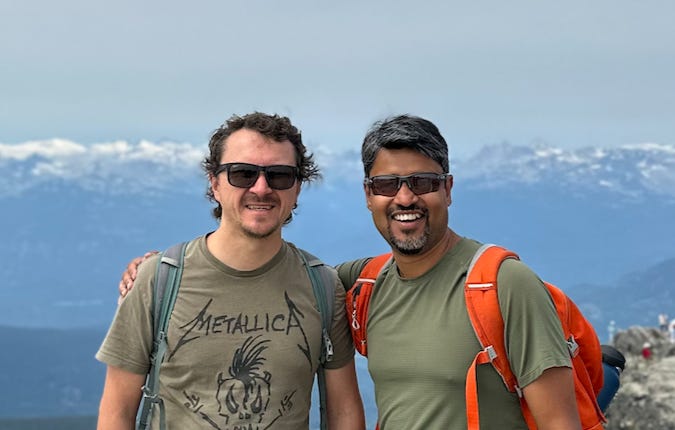
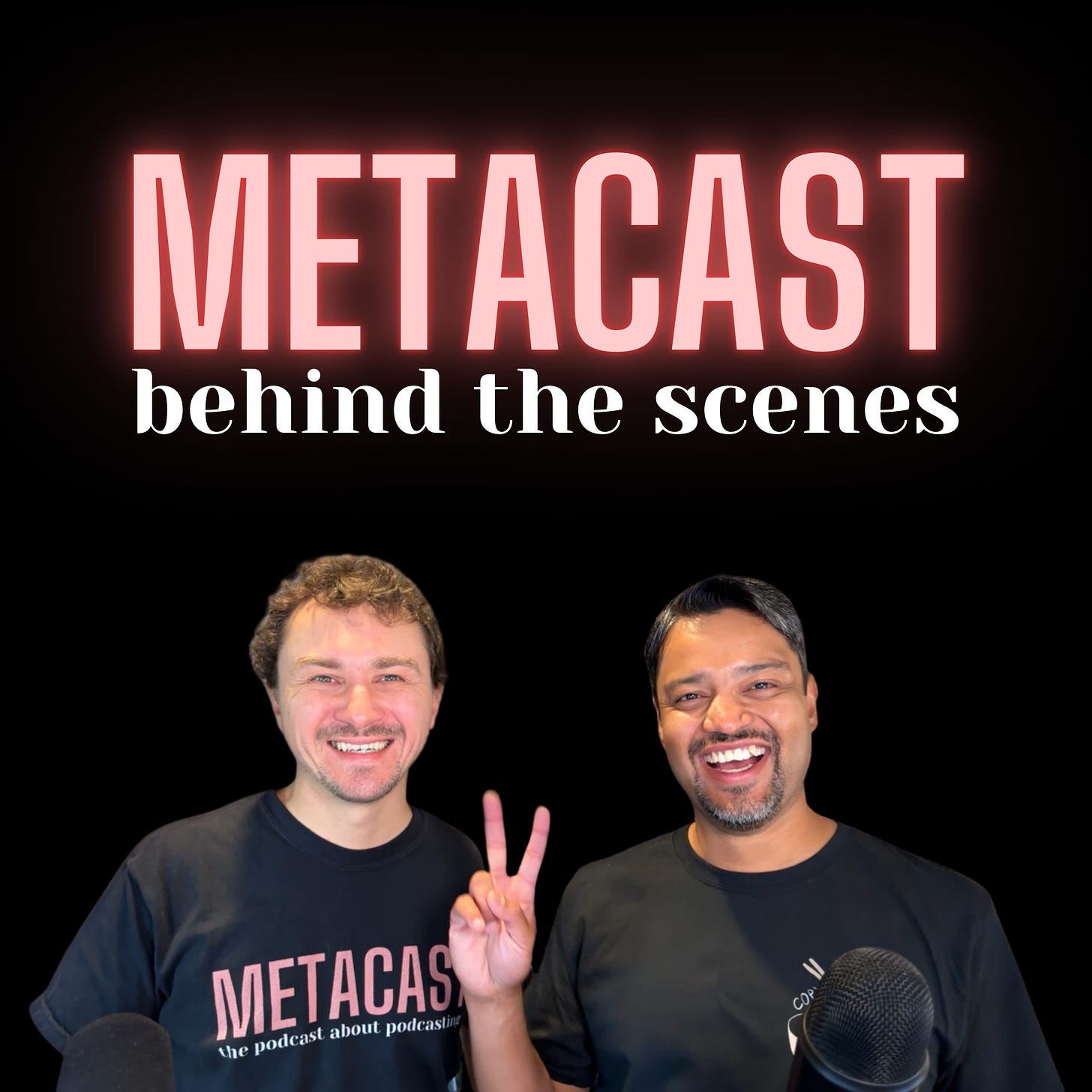

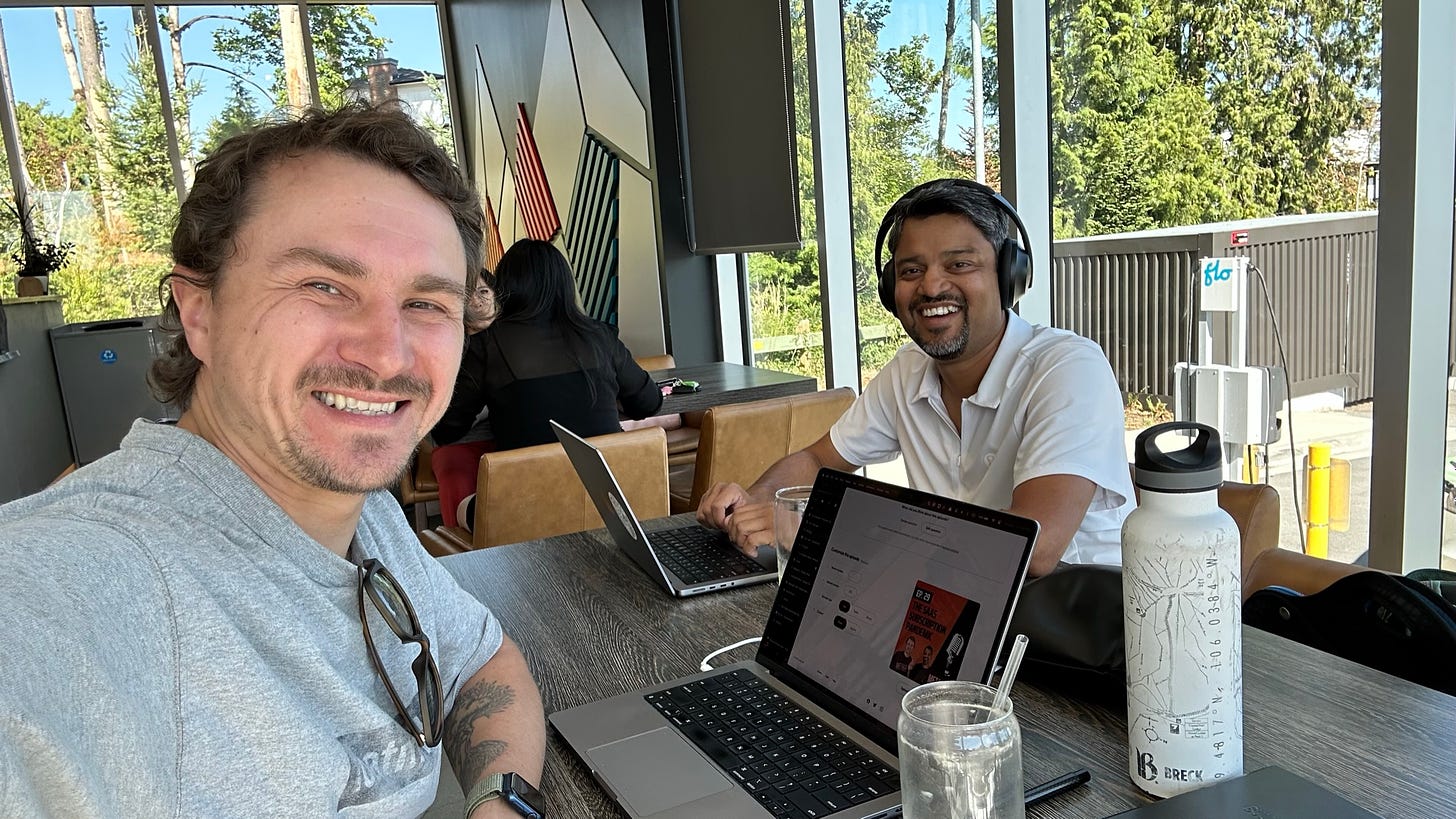
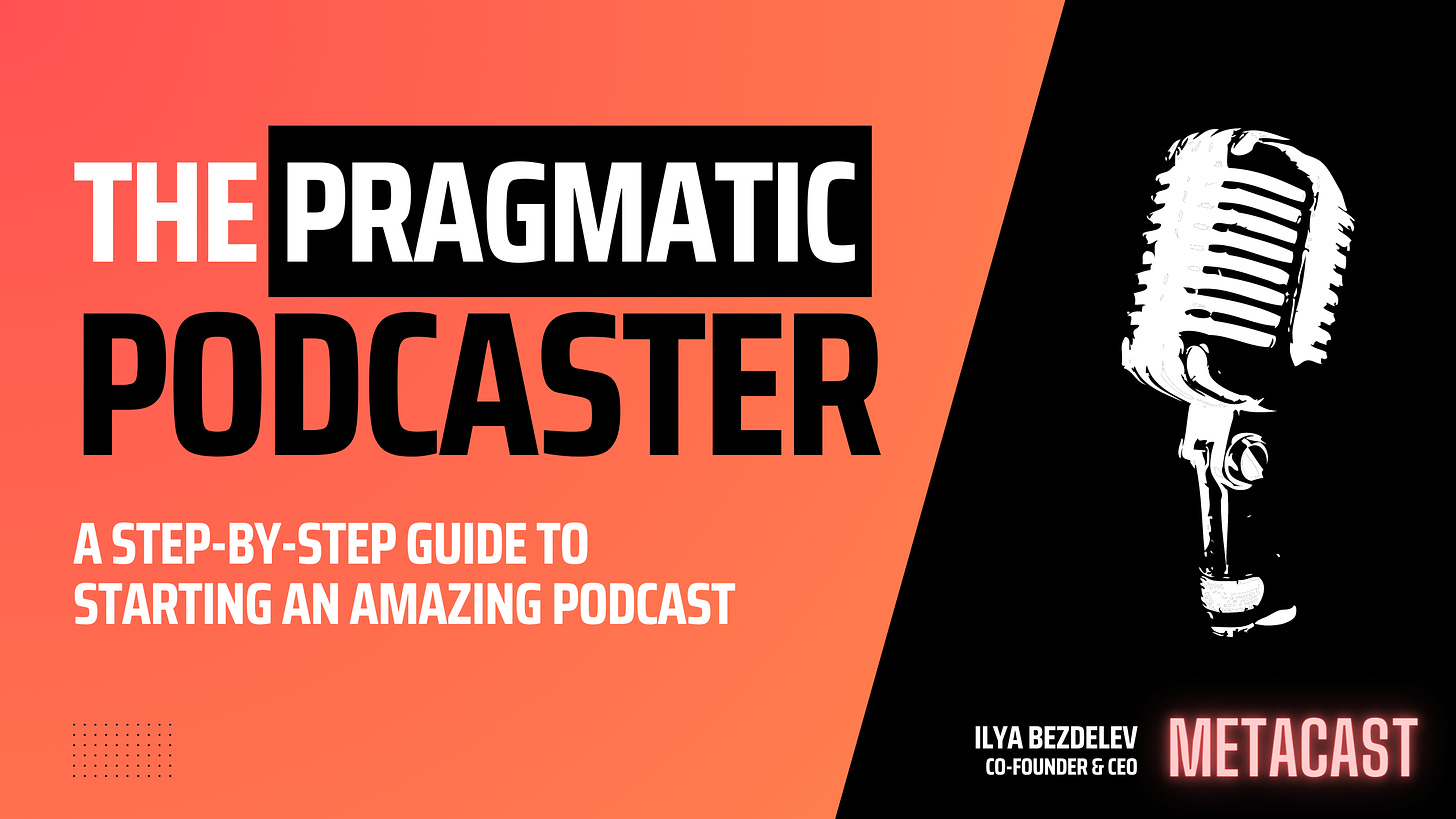
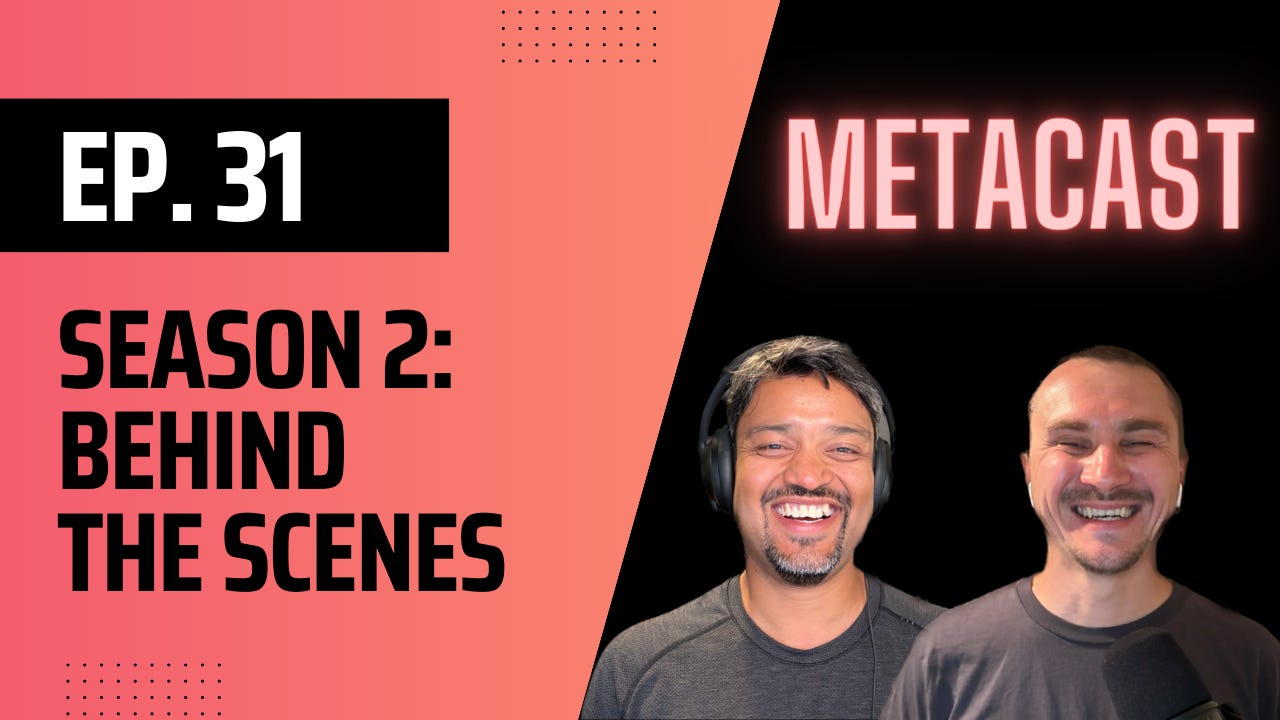
Love this one! Kudos Ilya.
Now let’s go make that amazing mission for the company happen 😂
I am a fan, thanks for this inspirational journey, no doubt this will be a successful one!